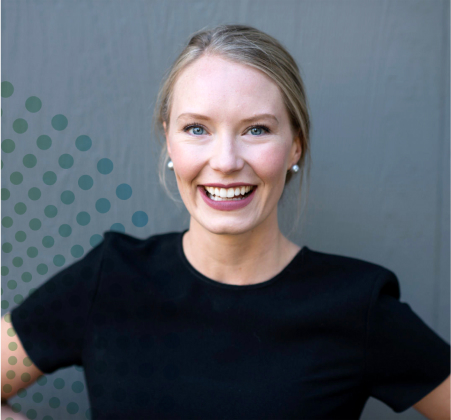Every year without fail, Paige Costello ’12 welcomes CMC students into her Bay Area workplace as part of the College’s annual Silicon Valley networking trip, hoping to inspire an “A-ha!” moment in CMCers considering tech or science-focused careers.
Dedicated both to CMC and the promise of these Silicon Valley industry treks, Costello, who is Head of AI and Product Management at Asana, intentionally replicates the enthusiasm shown to her when she was an eager student taking part in the annual Information Technology Advisory Board (ITAB) networking trip led by the late Bart Evans ’70.
For Costello, it’s more than an opportunity to give back; it’s an opportunity—drawing upon her professional experiences at Asana, and previously Intuit and Intercom—to increase context and confidence for CMC students trying to figure out where and how to start their careers.
“I believe exposure is key to discovering the breadth of possibilities in your career and your life,” she said. “The opportunity to widen the aperture ever so slightly for students is really exciting for me … to help them form a more accurate mental model of the vast array of things you can do to contribute to different types of organizations.”
A Literature and International Relations major at CMC, Costello began her tech career in product management at Intuit, which led to roles at Intercom, and then Asana, a work management platform, where she is on the forefront of the company’s application of AI.
Guiding the strategy and development of a company’s products or features, from planning to launch and beyond, appealed to Costello, who sees her career in product management as one ideally suited for a CMC grad. “Being strategic, analytical, and persuasive are all things that a lot of CMCers are uniquely good at,” she said.
Costello, who found CMC through the QuestBridge program from Arizona, was drawn to the College for its focus on leadership. She seized the opportunity to serve as an Athenaeum Fellow her sophomore year, and later rose to the moment when she was elected by her classmates as their Commencement speaker in 2012.
But that’s not all. A glance at her activities at CMC reveals that Costello left no opportunity unpursued, including studying abroad at the University of Granada; working as an analyst with the Roberts Environmental Center, and serving as a Research Assistant for award-winning novelist Jamaica Kincaid, who taught literature courses (“It was really wonderful to spend time with an author who was such a creative woman,” Costello recalled.).
During her first year at CMC, Costello met Alex Berman ’12, and the couple married in 2015, welcoming a son in August 2023. “We’re trying to pretend that we’re not going to put pressure on him to go to CMC,” Costello said with a laugh.
Costello’s senior thesis, “Prose and Polarization: Environmental Literature and the Challenges to Constructive Discourse,” bridged the disciplines of literature and government and won the Society of Policy Scientists Undergraduate Student Paper Prize.
From her perspective as an alumna working in tech, Costello extols the virtues and benefits of bridging disciplines as a component of CMC’s rigorous approach to a liberal arts education.
“It’s all about learning how to think and how to evaluate different perspectives and formulate an analysis, and draw an opinion or conclusion of your own. And that’s what is required in the workplace,” she said.
In her own workplace, as Head of AI at Asana, Costello is harnessing artificial intelligence to create efficiencies and improve teamwork. In her estimation, critical thinking and “creative leadership” have risen in value since the advent of AI.
“I honestly think being a curious person, and a reader … are still increasingly important. … I believe that it’s extra important to be able to think about whether something is true or false,” she said. “I also believe that (AI) increases the need for people to see opportunities and assess the landscape. … It’s going to be as critical as it has ever been to create individuals who have great character to be the decision-makers of the future.”
